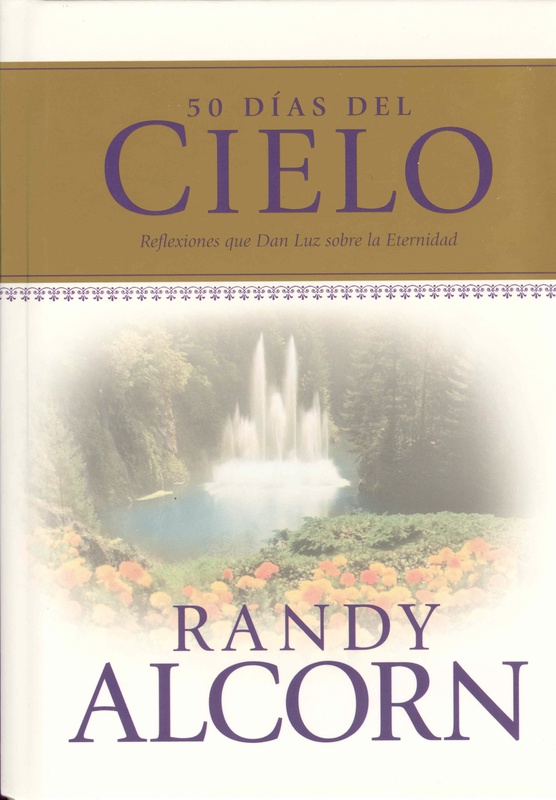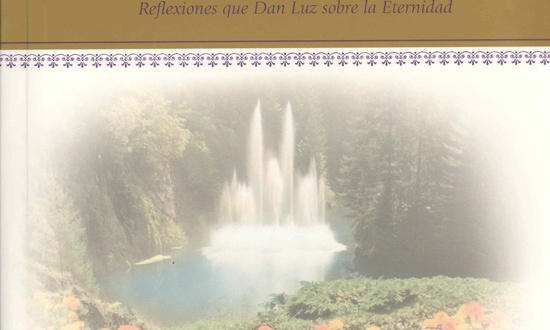Hermanos, no queremos que ignoren lo que va a pasar con los que ya han muerto, para que no se entristezcan como esos otros que no tienen esperanza. . . . Luego los que estemos vivos, los que hayamos quedado, seremos arrebatados junto con ellos en las nubes para encontrarnos con el Señor en el aire. Y así estaremos con el Señor para siempre. Por lo tanto, anímense unos a otros con estas palabras. —1 Tesalonicenses 4:13, 17-18
Una gran multitud de personas amadas nos está esperando; una grande y vasta muchedumbre de padres, hermanos e hijos, los que han alcanzado ya su propia seguridad, sin embargo ansiosos por nuestra salvación, anhelan que vengamos a su derecha y los abracemos, a ese gozo que será común para nosotros y ellos. [1] —El Venerable Bede
Un escritor afirma que cuando vayamos al Cielo, “No nos acordaremos de este viejo mundo que llamamos Tierra, . . . ¡ni siquiera lo recordaremos! Simplemente no nos vendrá a la mente.” [2]
Muchas personas creen esta interpretación errada, pero no es lo que dice la Biblia.
La memoria es una parte básica de la personalidad. El principio de la continuidad redentora indica que recordaremos nuestras vidas pasadas. El Cielo limpia nuestro registro en lo que se refiere al pecado y al error, pero no borra nuestro recuerdo de ellos. Las lecciones que aprendimos aquí en cuanto al amor, la gracia y la justicia de Dios por cierto que no se pierden, sino que se llevarán al Cielo. El Padre Boudreau declara: “Porque los pecados que tan a menudo nos hicieron temblar, son lavados en la sangre de Jesús, y ya no son, por lo tanto, una fuente de problemas. Más bien el recuerdo de ellos intensifica nuestro amor por el Dios de misericordia, y por lo tanto aumenta nuestra felicidad.” [3]
Un versículo, Isaías 65:17, se cita regularmente como prueba de que en el estado eterno no recordaremos nuestras vidas presentes: “Presten atención, que estoy por crear un cielo nuevo y una tierra nueva. No volverán a mencionarse las cosas pasadas, ni se traerán a la memoria.” Sin embargo, este versículo debería ser considerado en el contexto. Está ligado al versículo previo en el cual Dios dice: “Las angustias del pasado han quedado en el olvido, las he borrado de mi vista.” Esto no sugiere una falta literal de memoria, como si el Dios omnisciente no pudiera recordar el pasado. Más bien, es como si Dios dijera: “Nunca más me acordaré de sus pecados” ( Jeremías 31:34). No se trata de que él tenga un lapso mental, sino que elige no hacer mención de nuestros pecados pasados ni mantenerlos contra nosotros. En la eternidad, los pecados y los dolores pasados no le preocuparán ni a Dios ni a nosotros. Nosotros podremos elegir no recordarlos o pensar excesivamente en ninguna cosa que pudiera disminuir el gozo del Cielo. Eso no es lo mismo que hacer que nuestra memoria desaparezca y que nuestras relaciones se disuelvan.
Si nos olvidamos de que fuimos pecadores desesperados, ¿cómo podríamos apreciar la profundidad y el significado de la obra redentora de Cristo por nosotros?
Nunca olvidaremos que nuestros pecados clavaron a Jesús en la cruz porque el cuerpo de resurrección de Cristo todavía tiene las cicatrices de los clavos en las manos y en los pies ( Juan 20:24-29). Aunque Dios enjugará las lágrimas y el sufrimiento que son parte de este mundo, él no borrará de nuestra mente la historia humana y la intervención de Cristo. Como dije antes, la felicidad del Cielo no dependerá de nuestra ignorancia de lo que sucedió en la Tierra. Más bien, será realzada por nuestra perspectiva, nuestra apreciación informada de la gloriosa gracia y justicia de Dios cuando captemos lo que en realidad sucedió allí.
La palabra griega para verdad, aletheia, es una forma en negativo del verbo traducido “olvidar,” así que saber la verdad significa dejar de olvidar. En la Nueva Tierra habrá recordatorios de las doce tribus y de los apóstoles (Apocalipsis 21:12-14). Esto indica continuidad y recuerdo de la historia. Si estamos conscientes de otros eventos pasados en la primera Tierra, seguramente estaremos conscientes de nuestro pasado.
Cuando le preguntaron a George MacDonald si reconoceríamos a nuestros amigos en el Cielo, respondió: “¿Seremos más tontos en el Paraíso de lo que somos ahora aquí?” [4]
Y sin embargo muchas personas se preguntan si nos reconoceremos en el Cielo. Es una pregunta que se me formula con frecuencia, ¿pero por qué? Debido a la generalización del cristoplatonismo, que enseña que lo espiritual es incompatible con lo físico. Pero Cristo, en su encarnación y resurrección afirmó no sólo el reino espiritual sino también el físico. Su redención no fue sólo de espíritus sino también de cuerpos y de tierra. La falsa suposición detrás de la pregunta de si reconoceremos a nuestros seres queridos en el Cielo es que seremos espíritus incorpóreos que perderán sus identidades y recuerdos, ¿y cómo podría alguien reconocer a un espíritu?
Los discípulos de Cristo lo reconocieron muchas veces después de su resurrección. Lo reconocieron en la playa cuando cocinaba desayuno para ellos ( Juan 21). Lo reconocieron cuando le apareció al incrédulo Tomás ( Juan 20:24-29). Lo reconocieron cuando se les apareció a quinientas personas a la vez (1 Corintios 15:6).
En la transfiguración de Cristo, sus discípulos identificaron a Moisés y a Elías, aun cuando los discípulos no hubieran podido saber cómo se veían esos hombres (Lucas 9:29-33). Las Escrituras no dan ninguna indicación de que haya una erradicación de nuestros recuerdos que cause que no reconozcamos a nuestra familia y amigos. Pablo anhelaba estar con los tesalonicenses en el Cielo, y nunca se le ocurrió que no sabría quiénes eran o que no los reconocería. De hecho, si no reconociéramos a nuestros seres queridos, el “consuelo” de una reunión en la vida venidera, que se enseña en 1 Tesalonicenses 4:14-18, no sería consuelo en absoluto.
La misionera Amy Carmichael tenía fuertes convicciones sobre esta pregunta:
¿Nos reconoceremos los unos a los otros en el Cielo? ¿Amaremos y recordaremos? No creo que nadie deba preguntarse o dudar ni un instante sobre esto. . . . Porque si pensamos por un instante, lo sabemos. ¿Sería usted mismo si no amara y recordara? . . . Se nos dice que seremos como nuestro Señor Jesús. De seguro que esto no quiere decir sólo en santidad, sino que en todo; ¿y no conoce, ama y recuerda él? Él no sería quien es si no conociera, amara y recordara, y nosotros tampoco seríamos nosotros mismos si no lo hiciéramos. [5]
¿A quiénes ansía ver de nuevo en el Cielo? ¿Cree que le costará mucho reconocerlos o recordarlos? ¿Cree usted que su memoria será mejor o peor? ¿Cómo podría ser glorificado Dios por medio de nuestra memoria?
Padre, gracias porque tenemos todas las razones para anhelar reconocer y recordar a nuestra familia en el Cielo y regocijarnos en tu presencia por las vidas que compartimos y por las pruebas que pasamos juntos. En aquel día veremos tu propósito con claridad y sabremos sin sombra de duda sobre tu bondad y amor en medio de los tiempos difíciles de pérdida, confusión y sufrimiento que experimentamos en esta Tierra. Señor, recuérdanos que cada adiós a un ser querido que te conoce no es el final de nuestra relación sino sólo una interrupción, que será seguida por una reunión gloriosa, y por recuerdos gratos de nuestras vidas compartidas.
Extracto de 50 Días del Cielo by Randy Alcorn, Dia 37
[1] St. Bede, tomado de un sermón predicado alrededor del año 710.
[2] Salem Kirban, What Is Heaven Like? [¿Cómo Es el Cielo?] (Huntingdon Valley, Pa.: Second Coming, 1991), 8.
[3] Boudreau, The Happiness of Heaven, 117.
[4] George MacDonald, citado en Herbert Lockyer, Death and the Life Hereafter [La Muerte y la Vida Más Allá] (Grand Rapids: Baker, 1975), 65.
[5] Amy Carmichael, “Thou Givest . . . They Gather [Das ... Se Reúnen],” citado en Images of Heaven: Reflections on Glory [Imágenes del Cielo: Reflexiones de la Gloria], compilado por Lil Copan y Anna Trimiew (Wheaton, Ill.: Harold Shaw, 1996), 111.
Remembering and Recognizing
Brothers, we do not want you to be ignorant about those who fall asleep, or to grieve like the rest of men, who have no hope. . . . [We] will be caught up together with them in the clouds to meet the Lord in the air. And so we will be with the Lord forever. Therefore encourage each other with these words. —1 Thessalonians 4:13, 17-18
A great multitude of dear ones is there expecting us; a vast and mighty crowd of parents, brothers, and children, secure now of their own safety, anxious yet for our salvation, long that we may come to their right and embrace them, to that joy which will be common to us and to them. —The Venerable Bede [1]
When we get to Heaven, one writer claims, “We will not even remember this old world we call Earth, . . . nor will we even recall it! It simply will not come into our minds.” [2]
This misperception is widely believed, but the Bible says no such thing!
Memory is basic to personality. The principle of redemptive continuity indicates that we will remember our past lives. Heaven cleanses our slate of sin and error, but it doesn’t erase our memory of it. The lessons we learned here about God’s love, grace, and justice surely aren’t lost but will carry over to Heaven. Father Boudreau states, “For the sins which so often made us tremble, are washed away in the blood of Jesus, and are, therefore, no longer a source of trouble. The remembrance of them rather intensifies our love for the God of mercy, and therefore increases our happiness.” [3]
Isaiah 65:17 is often cited as proof that in the eternal state we won’t remember our present lives: “Behold, I will create new heavens and a new earth. The former things will not be remembered, nor will they come to mind.” However, this verse should be viewed in context. It’s linked to the previous verse, in which God says, “The past troubles will be forgotten and hidden from my eyes.” This doesn’t suggest literal lack of memory, as if the omniscient God couldn’t recall the past. Rather, it’s like God saying, “I will . . . remember their sins no more” (Jeremiah 31:34). It doesn’t mean that God has a mental lapse but that he chooses not to bring up our past sins or hold them against us. In eternity, former sins and sorrows won’t preoccupy God or us. We’ll be capable of choosing not to recall or dwell on anything that would diminish Heaven’s joy. That is not the same as having our memories disappear and our relationships dissolve.
If we forget we were desperate sinners, how could we appreciate the depth and meaning of Christ’s redemptive work for us?
We’ll never forget that our sins nailed Jesus to the cross; for Christ’s resurrection body still has nail-scarred hands and feet (John 20:24-29). Even though God will wipe away the tears and sorrow attached to this world, he will not erase human history and Christ’s intervention from our minds. As I’ve said before, Heaven’s happiness won’t be dependent on our ignorance of what happened on Earth. Rather, it will be enhanced by perspective, our informed appreciation of God’s glorious grace and justice as we grasp what really happened here.
The Greek word for truth, aletheia, is a negated form of the verb “to forget,” so that knowing the truth means to stop forgetting. On the New Earth, there will be memorials to the twelve tribes and the apostles (Revelation 21:12-14). This indicates continuity and memory of history. If we’re aware of other past events on the old Earth, surely we’ll be aware of our own.
When asked if we would recognize friends in Heaven, George MacDonald responded, “Shall we be greater fools in Paradise than we are here?” [4]
Yet many people wonder whether we’ll know each other in Heaven. It’s a question I’m often asked—but why? Because of the pervasiveness of Christoplatonism, which teaches that the spiritual is incompatible with the physical. But Christ, in his incarnation and resurrection, laid claim not only to the spiritual realm but to the physical realm as well. His redemption wasn’t only of spirits but also of bodies and of the earth. The false assumption behind the question of whether we’ll recognize loved ones in Heaven is that we’ll be disembodied spirits who lose our identities and memories—and how would someone recognize a spirit?
Christ’s disciples recognized him countless times after his resurrection. They recognized him on the shore as he cooked breakfast for them (John 21). They recognized him when he appeared to a skeptical Thomas (John 20:24-29). They recognized him when he appeared to five hundred people at once (1 Corinthians 15:6).
At Christ’s transfiguration, his disciples identified Moses and Elijah, even though they couldn’t have known what they looked like (Luke 9:29-33). Scripture gives no indication of a memory wipe that would cause us not to recognize family and friends. Paul anticipated being with the Thessalonians in Heaven, and it never occurred to him that he wouldn’t know them or recognize them. In fact, if we wouldn’t know our loved ones, the “comfort” of an afterlife reunion, taught in 1 Thessalonians 4:14-18, would be no comfort at all.
Missionary Amy Carmichael had strong convictions on this question:
Shall we know one another in Heaven? Shall we love and remember? I do not think anyone need wonder about this or doubt for a single moment. . . . For if we think for a minute, we know. Would you be yourself if you did not love and remember? . . . We are told that we shall be like our Lord Jesus. Surely this does not mean in holiness only, but in everything; and does not He know and love and remember? He would not be Himself if He did not, and we should not be ourselves if we did not.[5]
Whom do you look forward to seeing again in Heaven? Do you think you’ll have a hard time recognizing or remembering them? Do you suppose your memory will be worse, or better? How might God be glorified through our memories?
Father, thank you that we have every reason to look forward to recognizing and remembering our family and friends in Heaven and rejoicing together in your presence for the lives we shared and the trials we faced together. In that day we will see with clarity your purposes and know without a doubt your goodness and love in the midst of the hard times of loss and confusion and grief we experienced on this earth. Lord, remind us that every good-bye to a loved one who knows you is not the end of our relationship but only an interruption, to be followed by a glorious reunion and grateful remembrance of our shared lives.
Excerpt from 50 Days of Heaven by Randy Alcorn, Day 37
[1] St. Bede, from a sermon preached circa 710.
[2] Salem Kirban, What Is Heaven Like? (Huntingdon Valley, Pa.” Second Coming, 1991), 8.
[3] Boudreau, The Happiness of Heaven, 117.
[4] George MacDonald, quoted in Herbert Lockyer, Death and the Life Hereafter (Grand Rapids: Baker, 1975), 65.
[5] Amy Carmichael, “Thou Givest…They Gather,” quoted in Images of Heaven: Reflections on Glory, comp. Lil Copan and Anna Trimiew (Wheaton, Ill.” Harold Shaw, 1996), 111.




